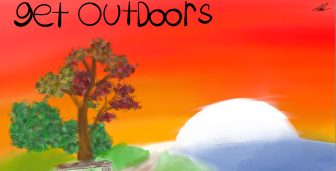
Get outdoors Logo.
This is the first story in a 4-part Great Lakes Echo series on environmental equity and access to the outdoors in the region
By Camryn Evans
For years, lack of outdoor equity has been something the Michigan Department of Natural Resources has been trying to find solutions for.
“Access hasn’t changed, but what has changed is what we are working to have, recreational space across Michigan closer to people’s homes,” said Ed Golder, a public information officer for the DNR. “People of color have told us that they don’t always feel comfortable in places to recreate.”
Projects in Flint and Detroit are in the works to address that situation.
The primary problems stem from the location of recreation facilities, lack of facilities, discomfort and lack of activity.
“The way we handle this is to create locations closer to populations like in Flint or Detroit as a way to serve those communities that have been historically underserved,” said Golder.
When COVID-19 hit, the number of those starting to become active outdoors began to rise.
“COVID-19 was record high for state parks,” said Golder. “Twenty-six million jumped to 35 million during the pandemic.”
State parks weren’t the only places in Michigan that have tried to maintain high levels of interaction with the public.
Cities like Detroit and Flint are moving to provide more recreation facilities available to the public.
According to Golder, funding to build a state park in Flint was recently approved and will allow for new recreation space for the city’s residents.
“There are great projects recently completed or underway that begin to improve that issue with William G. Milliken State Park, Belle Isle and the entire Riverwalk in Detroit,” said Jon Spieles, DNR’s acting chief of marketing and outreach. “There are also a ton of programs accomplished every year at the Outdoor Adventure Center in Detroit as well.”

Park in Flint, Michigan. Image: City of Flint
By promoting and hosting free fishing days in Detroit, the DNR has seen a jump in interest and outdoor activity.
Free fishing weekends happen twice a year where residents and non-residents are able to fish the Great Lakes and inland waterways without a license and without charge.
The ideas don’t stop there.
There have been classes created that help women become more familiar with outdoor activities, specifically hunting.
“We operate a program called Becoming an Outdoors Woman to help introduce women to a variety of outdoor activities,” said Golder. “We have seen the number of women hunting rise since the program was introduced.”
Becoming an Outdoors Woman offers workshops on hunting, fishing, backpacking, shooting sports, kayaking and more outdoor recreational activities.
According to Golder, each of these plans has sparked interest in the outdoor world among the public and provides an exciting outlook for Michigan residents to reconnect with nature.
“The vast majority of Michigan’s population lives detached from the natural world,” said Spieles. “The people of the state need to play and unwind in the outdoors if we hope they will change behaviors to keep it whole.”